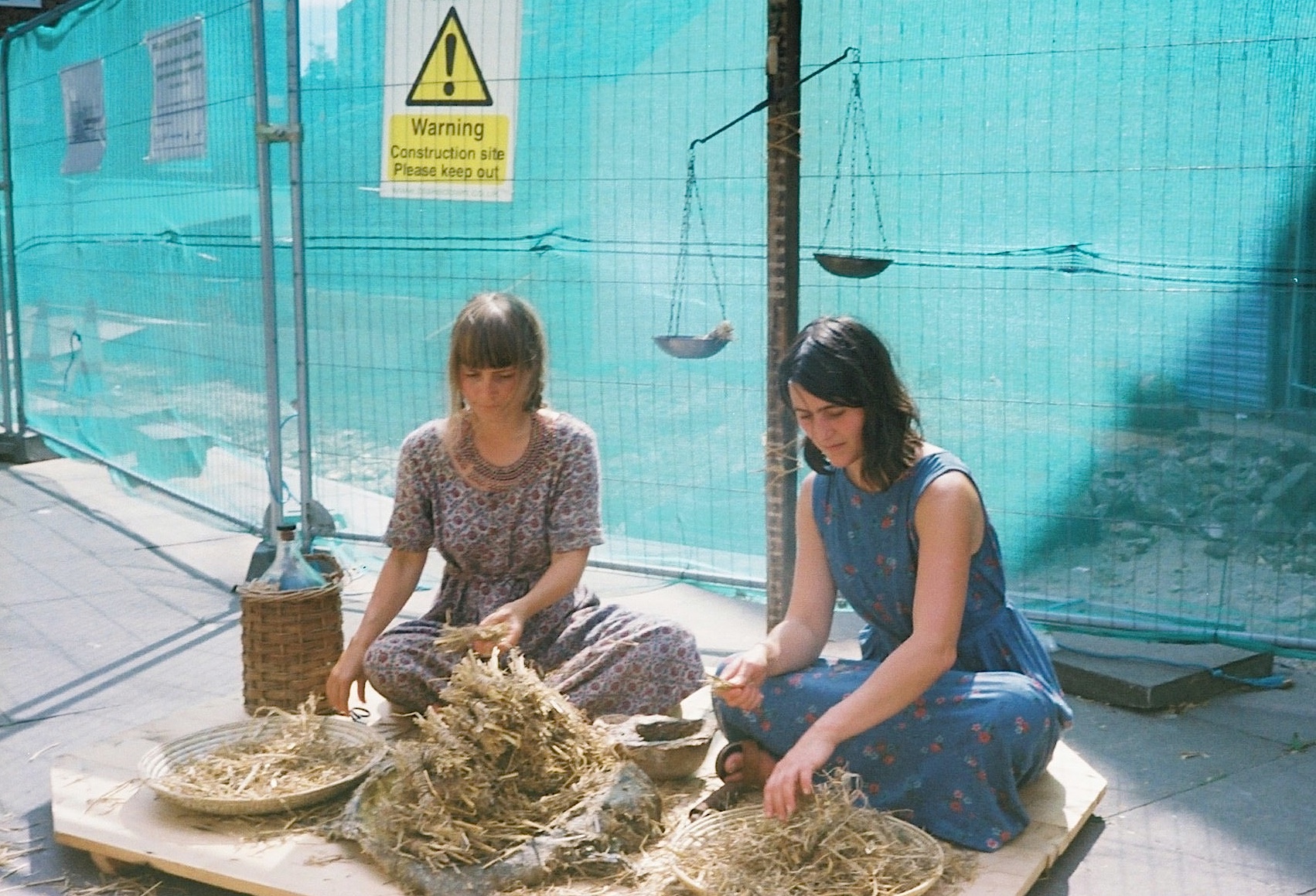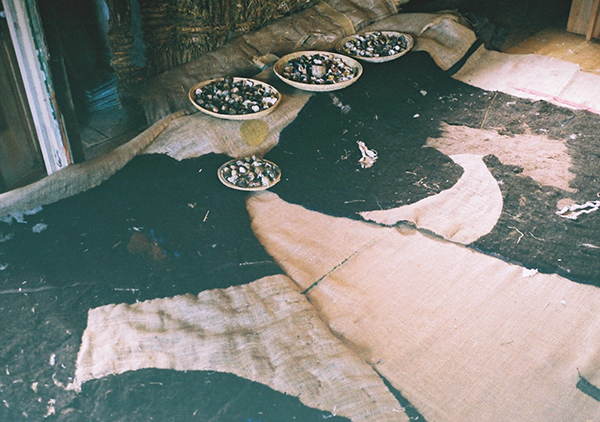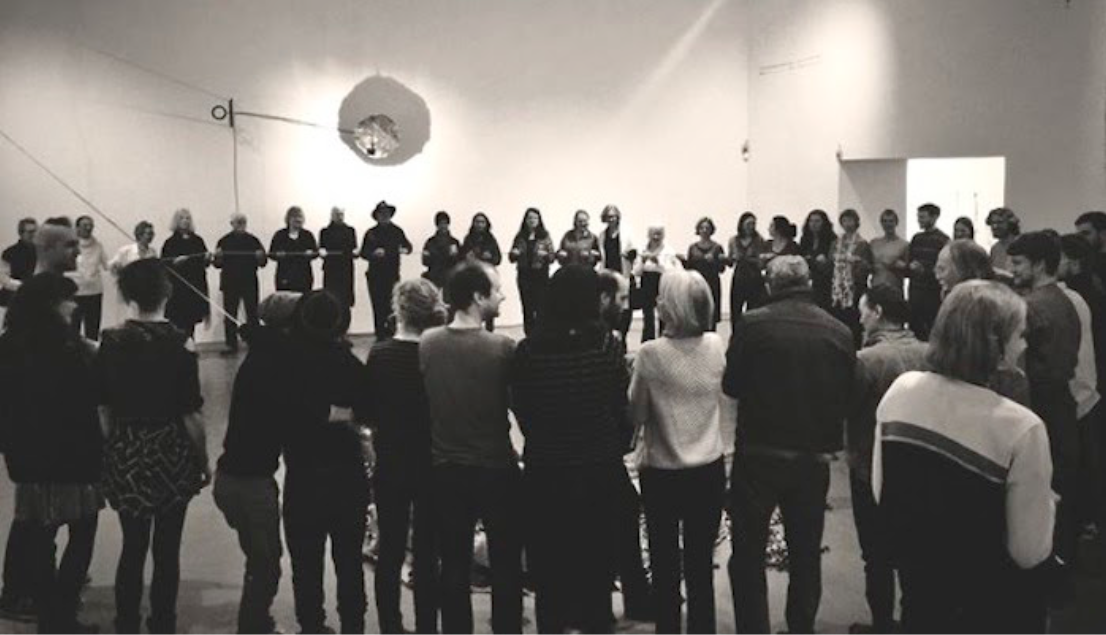17 Mar Crafting Conversations – The New Land

Each member of the Crafting the Commons network has been invited to write a post for the blog, capturing their thinking about commons and commoning as the project unfolds. This post is jointly authored by Fourthland and Patrick Bresnihan.
Fourthland: “Artworks are vessels for transforming exchange” Using sculpture, installation, performance and ceremonial practice Fourthland’s work repositions marginalized knowledge to address new modes of social and environmental consciousness with a longstanding commitment to social practice. Often working to weave together human and non-human communication Isik and Eva have developed Fourthland’s methods with inspiration from process-based psychology and yogic practice alongside in-depth studies into diverse cultures, astrology, and indigenous and alternative societies. Recent exhibitions and performances include: Touring show Legion Projects 2018-2019, Kestle Barton 2019, Haarlem Artspace 2019, Café OTO 2019, PEER 2018, SPACE 2018. With works shown at Somerset House, Arnolfini, Barbican, UCL, South London Gallery, with public projects in UK and internationally. Fourthland also host a nomadic residency program yörük that welcomes a range of people into a deeper journey with the thematics of the practice.
Dr Patrick Bresnihan: Patrick Bresnihan is a Lecturer in the Department of Geography at Maynooth University. He works across the interdisciplinary fields of political ecology, science and technology studies, and environmental humanities. He has published extensively, including articles on water infrastructure, urban commons in post-crash Dublin, and the poetics of John Clare. His book, Transforming the Fisheries: Neoliberalism, Nature and the Commons (University of Nebraska Press, 2016) won the Geography Society of Ireland Book of the Year in 2018.
Paddy: You describe the making of The New Land [the piece that will be shown in the exhibition] as involving two stages. First, weaving the straw with people in public, outside the gallery. This was out in the open and you didn’t know where it would go. The work and the direction of the work was shared. Then, once everyone had gone, you were left with the individual pieces of woven straw and the arduous task of stitching them together into something coherent and finished. You describe the physical pain of this part of the work and the frustration. This second stage was all done in private. I thought that was interesting, the visible and invisible work involved in crafting, especially because you accepted this distribution of work because it was your responsibility (to the work) – ‘being in service to’ which is a lovely phrase. Maybe that is where the work of commoning lies: negotiating the uneasy settlement of individual and collective, mine and yours, visible and invisible, rather than imagining some permanent state of openness and sharing.
Fourthland:

With bleeding fingers we
stitched one by one the
rolled up bundles
containing
the visions that we had been given by many
of a new land
“We felt summoned to do it, and when the summoning comes, there is no way out, it becomes like an obsession.“
The stages of transformation through making a piece – forming a crafting
- The Visible work – public part – external crafting – commoning
- The Invisible work – private part – bringing it together – mental and physical effort – internal crafting
Leads to
External common work

“ the work spread itself across every surface of our kitchen floor
integrating itself as part of our everyday domestic rituals “
Paddy: Your work often employs some form of generic (you use the word ‘archetypal’) work practice – like rolling straw. Because the work is basic it allows people to come together. And yet, something more than ordinary is made out of the many hands rolling straw, and your work stitching it together. The art (or craft) is in combining the mundane and the mythic. ‘Banal’ is another word that gets at this. It comes from the old French word ‘banel’, used to describe all things relating to the tenants of a feudal jurisdiction. From this came the popular notion of ‘open to everyone’ or commonplace. One of my favourite poets is John Clare. He lived in the early part of the 19th century and witnessed the enclosures of the land around where he lived in Northamptonshire. He observed in minute detail the world around him, collecting objects, drawing birds and flowers, keeping journals. When he wrote about these things in his poems he didn’t imbue them with any higher meaning like the romantic poets often did. His willingness to just record and witness things in the here and now (including their loss through enclosure) evokes something universal – what his friend Thomas Porter called ‘universal feelings.’
Fourthland:
WITHIN THE WEAVING OF COMMONS
Uncertainty – awkwardness – transitioning through a ‘barrier’ together – how people come together through conflict, through uncertainty.
The Mundane – overcomes the awkward
The Mundane – allows things to move through
The importance of repetition
Fourthland: When making the new land the following questions emerged…
“What are you carrying?
As an archetypal question ….
We see our objects and our gestures as a way of prompting an interaction, an exchange between strangers
This summons what we call
HANDHELD KNOWLEDGE
Ancestral knowledge stored in the hand, awoken through handling
And
THE BEGINNINGS OF CULTURE
an expanding cellular system of trust between people
We see that working with these together can support us to
CRAFT A NEW FUTURE
making ‘the process’ visual again
Inspired by what Joseph Campbell says
“Myths are public dreams, dreams are private myths”


